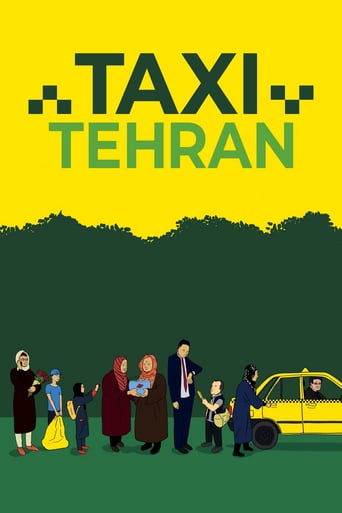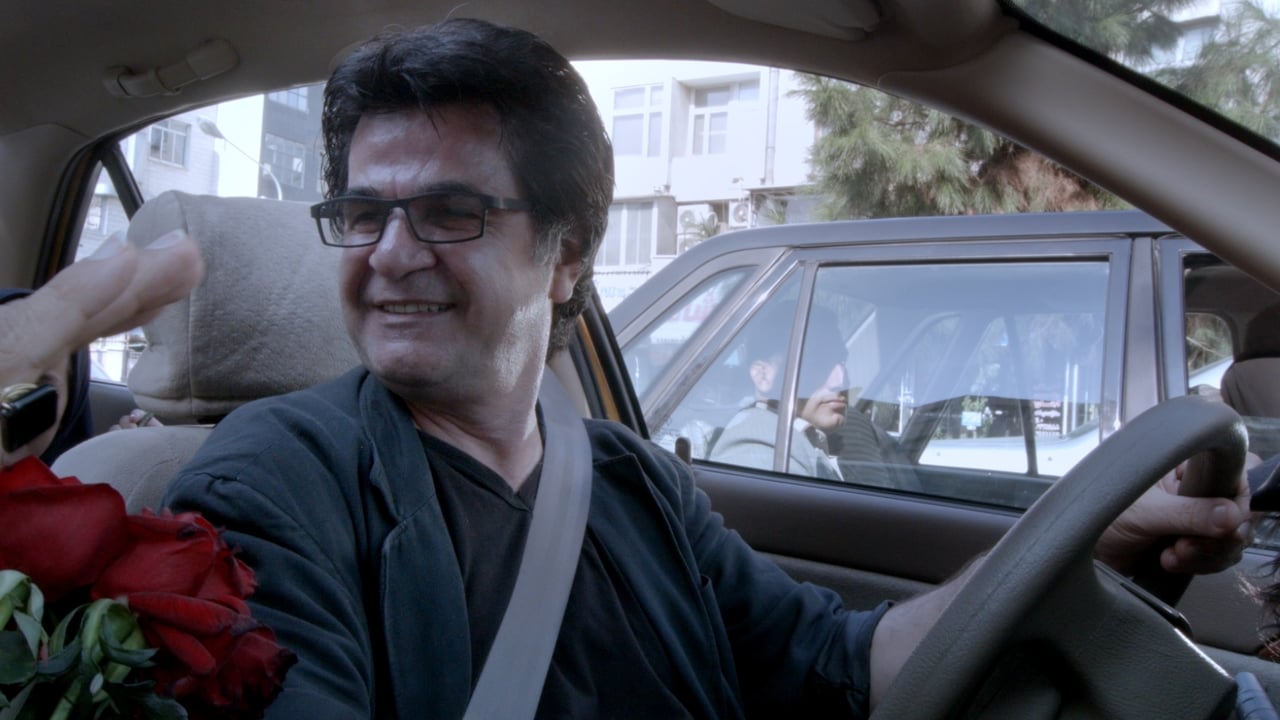MartinHafer
Jafar Panahi is an Iranian filmmaker who has made some very interesting films, such as "The Mirror". However, despite his films seeming to be very slight, enjoyable and rather apolitical, he's gotten into trouble with his government. He was arrested back in 2010 and no specific charges were forthcoming for some time. In the meantime, filmmakers from all over the world pressed for his release. Eventually he was released but the government also said that he "was making a film against the regime and it was about the events that followed the [2009] election" and that was why he was detained. Because of these vague charges, Panahi has been banned from filmmaking for 20 years. But, Panahi has continued to fight this and made "This Is Not a Film" (2011) and "Taxi" (2015) while under this ban. These projects were smuggled out of Iran and have been shown in the West...and the exact consequences to Panahi are uncertain. As far as his latest film, Taxi, is concerned it's an extremely strange project--so strange I really cannot rate it. The film is completely untraditional and I've never seen anything like it. The film looks like a documentary with no real actors, though the story is in fact a story and the folks participating are not unsuspecting members of the public. In the film, Panahi plays himself and he's inexplicably driving a taxi and using a dashcam to record his passengers. The recordings are supposedly meant to illustrate some of the societal themes Iranians are struggling with and they supposedly talk without realizing they are being filmed. Among the many themes you learn about is an underground cottage industry which illegally disseminates banned Western films, how the incredibly strict Sharia Law is impacting society negatively as well as the overall climate of suspicion and secrecy. It's all incredibly strange and looks a lot like a reality television show...albeit one set in Iran.So did I love the film? No...not really. It is very interesting and thought-provoking but it also lacks the sort of narrative or style of a film. There are no real opening or closing credits and it looks more like raw footage of Panahi and his passengers was simply smuggled out of the country. Because of this, you cannot rightfully give the film a score such as an A, B or C...it's more a piece of art that also has the ability to place the viewer into the cab along with these people to glean little snippets of their lives and their concerns. Intriguing and out this week on Netflix.
ctowyi
Acclaimed Iranian director Jafar Panahi drives a cab through the streets of Teheran. The changing passengers speak out openly what is on their mind. A female teacher and a young man discuss death penalty, a bootlegger offers the new season of "The Walking Dead" and some Woody Allen movies, two old women want to transport their goldfish in a glass bowl to a holy place, a young woman wants to transport her much older husband who has been injured in an accident, and a cheeky little girl explains the rules of Iranian filmmaking and her entitlement to a frappuccino.A highly emotionally satisfying miniature. On the surface it feels small and funny, but underneath it is seething in anger and defiance at the Iranian government. One of the stuff that makes the movie so unusual is that it is so difficult to pinpoint whether everything is planned or caught in the spur of the moment. Especially the final scene which kept my mind wondering. I really like this a lot. More so when I found out about the sad state of affairs for Jafar Panahi. He is actually banned from making movies for 20 years because he was deemed to have crossed the "sordid realism" line drawn by the Iranian government. How he subtly pokes fun at the authorities is hilarious and yet warm. The whole 80+ min film feels like a window into another world, a world not unlike ours, especially when Eric Khoo's most recent film is deemed "unscreenable". One of the most important films I have seen this year. Now I feel like hunting down The White Balloon, Closed Curtains and This Is Not a Film.
shawneofthedead
Imagine, if you will, a world in which you may walk freely on the streets, but are hardly free at all. That's the world in which Iranian director Jafar Panahi lives, breathes and tries to work - one we're introduced to in gentle, tartly comic fashion in his latest film. Taxi, which won the Golden Bear at the 2015 Berlin International Film Festival, gives viewers a seductive, sobering glimpse into modern- day Iran, a country where criminals are executed for petty theft and women jailed for trying to attend a men's volleyball match.The premise of Taxi is simple - Panahi himself, with cameras cleverly affixed throughout his vehicle, drives a taxi through the teeming streets of Iran. Throughout the day, Panahi the cabbie picks up strangers, friends and relatives, played by themselves or non- professional actors. Along the way, he makes idle conversation with them, or they chat amongst themselves - ordinary chatter that carries quite extraordinary import.It's fascinating, thought-provoking stuff, delving deeply into ideas and questions about Iran and its politics while firmly couched in the language of the everyday. Two passengers launch into an impassioned discussion on the merits (or lack thereof) of capital punishment and syariah law. The broken body of a man is bundled into the backseat and, with what he thinks is his dying breath, he tries to circumvent laws that will prevent his sobbing wife from inheriting their home. Art and ideas are sold on the streets, the stuff of covert piracy, as the precocious Hana Saeidi, Panahi's young niece, relates to him the lessons she has learnt on how exactly to make films that will be 'screenable' in Iran.To be honest, the final film is an amiable if somewhat rickety affair. Parts of it work better as metaphors, faltering somewhat in the execution. For instance, Hana is, literally and metaphorically, the future - both of Iran and, with her own little hand-held camera, filmmaking. But the moment when she tries to exert control over a scene she's shooting from the window of the taxi, haranguing a little boy to behave differently so that her footage will pass muster in school, feels a little too on-the-nose. In a couple of instances, it's easy to identify the issues Panahi wants to raise: in a bowl of fish or an iPad video, he finds insights about the power of superstition and the tragedy of poverty. But the scenes themselves don't always work as well, ambling when they should sprint.Nevertheless, it's impossible to remain unmoved by the quiet power and heartbreaking passion of Taxi. This is a gem of a film: subtle, leisurely and surprisingly funny; thoughtful and deep but rarely overbearingly so. It's all the more impressive, of course, as a testament to Panahi's ongoing refusal to bend and break beneath the 20-year filmmaking ban that was slapped on him in December 2010. Since then, he's smuggled a film out of Iran on a flash drive baked into a cake, and assembled Taxi out of cam footage shot in broad daylight in Tehran. That's why, in ways both big and small, Taxi serves as a bold reminder of the bravery and strength of the human spirit.
R-Clercx
I refer readers to other comments for more details on the story line itself.I want to add however although this movie is presented in cinema 'vérité' style (meaning wanting to give the viewer the impression that what is shown is simply reality itself -for instance like the most famous example 'The Blair Witch Project'- the entire movie is however scripted with anonymous actors.But, this is also the drawback. Although as a viewer one expects to see real life situations as they would have been filmed on the fly while the director picks up random passengers calling a cab, all scenes are an act and one can not feel but a slight disappointment when the illusion is revealed. Like another reviewer points out correctly; some of the stories, especially the lighter ones in which the director doesn't directly seek to comment or criticize the regime in Iran are funny but feel as a warming up and slightly out of place or only as a counterbalance for the more full on portrayal of what is 'really' happening in Teheran. It's only from the second act (portraying how all kinds of imposed restrictions and censorship from a government lead to a black market and circumventing censorship) and the dialog with the child that has to meet the same restrictions posed on film-making for an assignment like the director needs to oblige to, the movie becomes a direct statement and outcry for the freedom of thought and expression.Personally I think that the movie, if it would have been truly a documentary with real passengers, it might even have been a stronger piece of capturing reality. But probably this approach would have been far too dangerous, as the privacy of the passengers would have been breached which might be very dangerous in a clear dictatorship like in Iran.Now, with a scripted movie sometimes it comes across as a director showing a clear 'see, I can still make movies' to the government that imprisoned him for making movies. I wonder how Iranian government will react when they surely will find out that the director made another one.Much of the appeal and the praise for the movie can be seen as applauding for the clear message in the film, which is all about the right to question an opposed reality. One can not help feel sorry for imprisoned artists, no matter where. Europeans and Americans might applaud this movie the loudest, but the Edward Snowden or Julian Assange story shows that this movie is not only about the Teheran situation. Propaganda happens everywhere: be it in Teheran, Islamic countries in general or in western consumerism and capitalism countries.Most governments try to portray a positive view about one's own culture ('The American Dream', 'Freedom of expression'), head into war either praying to Allah, God or other metaphysical spirits for good luck and strive to export their cultural values elsewhere, at the same time alienating cultures which hold other values.In Teheran filmmakers can not show men wearing a tie, which might seam strange and unsettling to westerners, but from a Teheran culture point of view, the tie is a sexual symbol pointing to the genitals. As such, one can also ridicule the western view in which men are obliged to wear a tie as dress code, which biologically is nothing but an arrow pointing to one's genitals. Now, how strange is that?The director however does a very good job of portraying to which surreal situations censorship may lead. Purely technical and from a script point of view it is certainly not a brilliant movie, the loud applause and praise comes from those who are very much into the 'freedom of expression' propaganda and the idea of filming an entire movie in a cab has been done before.Never the less, it is a must see movie, because it drags the viewers as peeping Tom's into a culture that may vastly differ from their own. One might find that people from other cultures and convictions are first and foremost human.



 AD
AD

